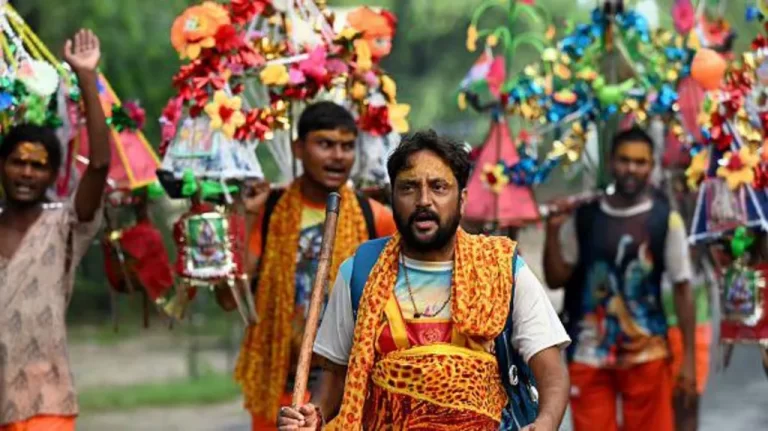India's Supreme Court has put on hold a controversial order that directed restaurants along the route of an annual Hindu pilgrimage to display names of their owners and operators. The order was issued by Uttar Pradesh and Uttarakhand – states governed by the Bharatiya Janata Party (BJP), which is in power federally – ahead of the Kanwar Yatra, which began on Monday.
Opposition parties and even BJP allies criticised it, saying it targeted Muslim-owned establishments and could affect livelihoods. State authorities claimed the order was meant to maintain law and order.
But on Monday, India's Supreme Court temporarily halted the order while hearing a batch of petitions challenging it. The judges said the eatery-owners only needed to display names of items they served. The petitions, filed by civil society activists and opposition MP Mahua Moitra, argued that the orders were “discriminatory on grounds of religion and would further the cause of untouchability [outlawed in India]”.
What is the controversy?
The row began last week when authorities in Uttar Pradesh's Muzaffarnagar and Saharanpur districts asked eateries along the pilgrimage route to display their owners' names to prevent “confusion” among devotees – who avoid meat and alcohol during the pilgrimage.
The annual pilgrimage takes place during the Hindu holy month of Sawan. Devotees of the Hindu god Shiva travel on foot, sometimes for days or weeks, to religious sites along the holy Ganges river to collect water and offer it at Shiva temples.
The pilgrims are mostly young men, who pass through states such as Uttar Pradesh, Uttarakhand, Madhya Pradesh, Haryana, Delhi and Rajasthan on their way to and from temple towns.
Traffic restrictions are usually in place and police are deployed to maintain order. But incidents of violence and vandalism have been reported in recent years as large numbers of young men pass through busy cities – sometimes walking in the middle of the road – with little crowd control.
After criticism from opposition parties, the Uttar Pradesh government – led by Hindu monk-turned-Chief Minister Yogi Adityanath – widened the ambit of the order to cover the entire state during the pilgrimage.
Mr Adityanath had earlier this year prohibited the sale and purchase of meat in the open along the pilgrimage routes as a mark of “respect” for devotees. Uttarakhand state and Madhya Pradesh's Ujjain city also ordered restaurants to display names of owners and employees on their boards.

Uttarakhand Chief Minister Pushkar Singh Dhami cited past instances of criminal incidents “over some hotel and dhaba [eatery] operators hiding their true identities” and said the order was aimed at preventing such cases in future.
And the reactions?
Opposition parties called the order “divisive” and accused the governing BJP of facilitating an economic boycott of Muslims. The issue was raised at an all-party meeting held on Sunday ahead of the budget session of parliament, news reports said.
And even allies of the BJP have criticised the move.
“A Kanwar Yatra bigger than this [in Uttar Pradesh] takes place in Bihar. No such order is in effect there,” KC Tyagi, spokesperson of BJP's ally Janata Dal (United) said, urging the governing party to review the order.
Chirag Paswan, chief of Lok Janshakti Party, another BJP ally, said: “Whenever there is such divide in the name of caste or religion, I absolutely do not either support it or encourage it.”
What is the impact?
BBC Hindi visited Muzaffarnagar, where deadly Hindu-Muslim riots had left at least 60 people dead in 2013. Several local vendors and shop owners said they thought the order was “an attempt to alienate Muslims”.
Many shops, eateries and road-side food stalls along the highway from Delhi to Uttar Pradesh displayed the names of their owners and workers in big, bold red letters. Some said they had been forced into it by the police.
But authorities claimed that eatery owners in the district had voluntarily complied with the order. Vakeel Ahmad, the owner of Lover’s Tea Point, a popular tea shop in Muzzafarnagar's Khatauli area, said he renamed it Vakeel Sahab Chai after a police visit.
“But police visited again and argued that the name does not make it clear that I am a Muslim. They forced me to put up another signboard with the name Vakeel Ahmad.” Mr Ahmad said it was upsetting to change the decade-old identity of his shop.
A food stall owner said he had removed four of his Muslim employees, including the manager of his eatery. “You need to understand our situation. We don’t want any controversy,” he said on condition of anonymity.
The Hindu owner of another eatery in the district said the police had visited his shop to ask if he employed any Muslim workers. “I told them I did not have any working for me at present. They advised me against employing any Muslims,” he alleged.
Abhishek Singh, a senior police officer in Muzaffarnagar, did not respond to the accusation but directed the BBC to a statement issued by the police which said the shopkeepers had been asked to display the names voluntarily.
One restaurant owner said a Muslim employee working in his shop had “left on his own”, saying he didn't want others to be in trouble because of him. Restaurant owners say they have been under pressure since last year, when a local Hindu religious leader began demanding that Muslim-owned eateries named after Hindu gods and goddesses be shut.

Since then, many such eateries have shut down and some have been rented out to Hindus. But while the controversy continues, some pilgrims who are setting out on the journey said it didn't matter to them who owned or worked in a shop.
“It doesn’t matter if the shop belongs to a Hindu or a Muslim. Everybody here respects a pilgrim. While buying something, we never look for the name of the person selling it,” said Vishal Bhola.
— CutC by bbc.com


